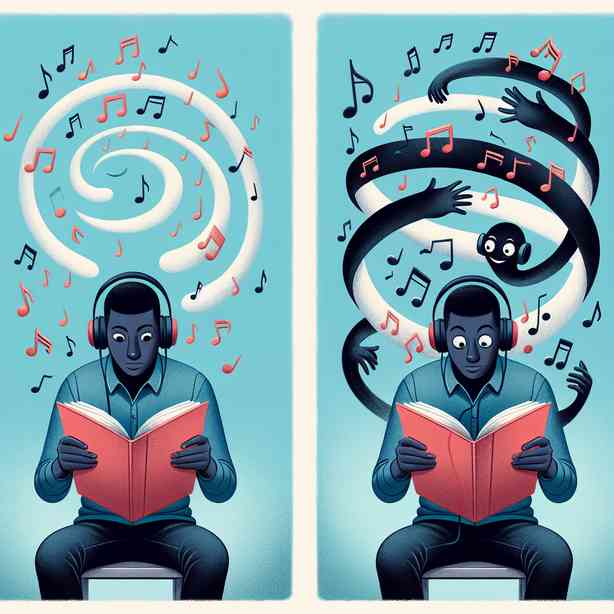
When Music Helps You Focus, Then Distracts You
Music has been an integral part of human culture for millennia. From ancient rituals to modern-day playlists, its influence permeates our daily lives. One area where music’s impact is frequently debated is in relation to focus and productivity. Many people swear by music as a tool that enhances concentration while others find it to be a significant distraction. This duality begs the question: how can music both help us focus and potentially divert our attention?
To understand the complex relationship between music and focus, it is essential to examine how our brains process sound. The brain is remarkable in its ability to filter and prioritize sensory information. When we listen to music, our brains engage in a series of intricate processes, deciphering melodies, rhythms, and lyrics. This cognitive load can either enhance our focus or detract from it, depending on various factors such as the type of task undertaken and the kind of music listened to.
Research suggests that certain types of music can indeed create an optimal environment for concentration. Instrumental music, for instance, is often cited as a beneficial choice. The absence of lyrics minimizes distraction, allowing listeners to immerse themselves in their work without the interference of words vying for attention. Genres like classical, ambient, and electronic music have been favored in academic studies for their ability to create a conducive atmosphere for various tasks, enhancing productivity by promoting a state of flow.
The tempo of the music can also play a role in determining its effectiveness as a focus aid. Fast tempos can elevate energy levels and increase motivation, making them beneficial when engaging in tasks that require physical activity or creativity. Conversely, slower tempos often evoke a sense of calm, which can help in tasks that require sustained attention and deep thought. This dynamic interaction between tempo and task type further highlights the nuanced relationship between music and focus.
However, not all music is created equal when it comes to promoting concentration. Popular music, with its catchy hooks and lyrical content, can easily pull the listener’s attention away from the task at hand. Engaging lyrics may trigger associative thinking, leading the mind to wander as it contemplates the song’s narrative or meaning. This distraction can be particularly detrimental in environments where deep concentration is required, such as studying for an important exam or completing a deadline-driven project.
Beyond the characteristics of music itself, individual preferences and emotional responses also play a significant role in determining whether music is beneficial or distracting. Some individuals may find solace and focus in their favorite songs, while others might be unable to separate their emotional connection to the music from their work, leading to a decline in productivity. Understanding one’s own relationship with music is crucial in identifying whether it acts as an aid or hindrance.
Moreover, the context in which music is played can alter its effects on focus. For instance, background music in a café can enhance creativity and social interaction, while the same music might be counterproductive in a library where silence promotes concentration. The environment, coupled with the type of task and personal listening preference, creates a unique landscape in which music can either enhance or impede focus.
It is also vital to observe how habits and routines influence the relationship between music and focus. For some, listening to the same playlist while working can condition the brain to associate those specific tunes with a focused mindset. This creates a form of musical Pavlovian response, wherein, over time, the brain learns to enter a state of concentration upon hearing those familiar sounds. On the flip side, frequently changing music or playing tracks that arouse strong emotions can result in cognitive dissonance, which distracts from the task and leads to decreased effectiveness and productivity.
In conclusion, the complex interplay between music and focus is shaped by variables such as genre, tempo, individual preferences, task type, and context. While some individuals find that music serves as a beneficial tool for enhancing focus, others experience its potential to distract. Ultimately, awareness and personalization are key to optimizing our environments for productivity. By experimenting with different types of music and observing how they affect your concentration, it becomes possible to navigate the delicate balance between focus and distraction effectively. Engaging with music mindfully can transform it from a distraction into a powerful ally in the quest for heightened productivity and enhanced cognitive performance.


